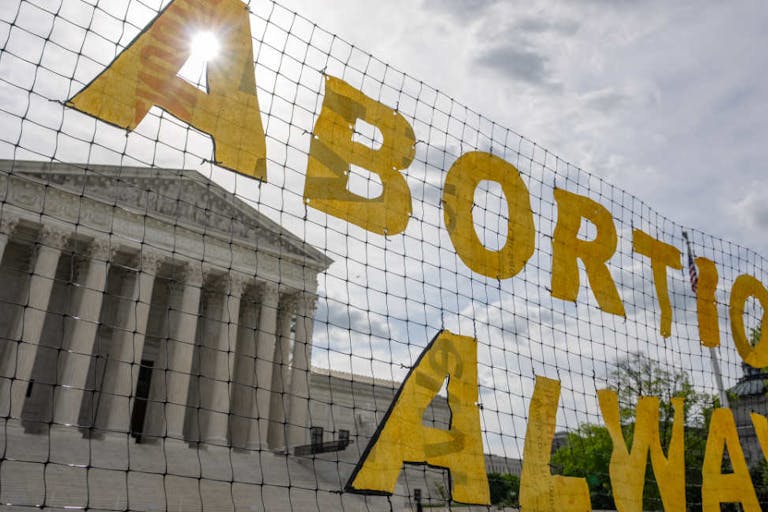
Judge denies anonymity for victim of forced abortion
Cassy Cooke
·
Another leak? Supreme Court posts and removes decision about emergency room abortions
A document written by the Supreme Court appears to have been leaked regarding the Court’s decision in the Moyle v. United States and Idaho v. United States cases, which determined whether under the federal Emergency Medical Treatment & Labor Act (EMTALA), emergency room doctors can intentionally end the lives of preborn children via abortions. The document indicates that the court may be ruling in favor of allowing abortions to be committed in emergency rooms by returning the case to a lower court.
Today, the Supreme Court released two opinions, neither of which were related to abortion. However, during the process of releasing opinions to the public, Bloomberg Law stated a document was mistakenly published, and then deleted, from the Supreme Court website. Supreme Court spokeswoman Patricia McCabe confirmed to the Washington Post that a document was released, but did not say what the document was. “The Court’s Publications Unit inadvertently and briefly uploaded a document to the Court’s website,” she said. “The Court’s opinion in Moyle v. United States and Idaho v. United States will be issued in due course.”
According to Bloomberg, the document indicated that the court will issue a 6-3 ruling lifting a stay it previously placed on a federal district court order as the case progresses further, giving the Biden administration a temporary victory. Justices Clarence Thomas, Samuel Alito and Neil Gorsuch were the three dissenters. Bloomberg said information on why the decision was made was not given, just that the appeals from the state of Idaho are dismissed as “improvidently granted.” Justice Ketanji Brown Jackson reportedly wrote, “Today’s decision is not a victory for pregnant patients in Idaho. It is delay. While this court dawdles and the country waits, pregnant people experiencing emergency medical conditions remain in a precarious position, as their doctors are kept in the dark about what the law requires.”
Justice Samuel Alito, meanwhile, reportedly said the court “has simply lost the will to decide the easy but emotional and highly politicized question that the case presents.”
Previously, the Biden Department of Justice (DOJ) sued Idaho, claiming that the state’s Defense of Life Act — which protects preborn children from abortion — violates the Emergency Medical Treatment and Active Labor Act (EMTALA), which requires hospitals receiving Medicaid funding to provide stabilizing care to any patient in an emergency, regardless of their ability to pay. The Biden administration has claimed that “stabilizing care” could include abortion. Idaho asked the Supreme Court to intervene, and the court agreed.
READ: Supreme Court hears oral arguments on whether ERs have to commit ’emergency’ abortions
According to the DOJ, women’s lives will be at risk if emergency room doctors cannot commit abortions. Induced abortion, however, in which a child is intentionally killed, is not medically necessary. An early delivery, where a preborn child is not intentionally killed, is also not considered an induced abortion, and is legal in Idaho. Other legitimate medical treatments during emergency situations, such as ectopic pregnancies and miscarriages, are also legal (in every state, not just Idaho). In Idaho specifically, all of these procedures are legal if the woman’s life is at risk, or in cases of rape or incest.
The requirement under EMTALA is for emergency rooms to stabilize the patient experiencing a medical emergency, and then transfer them to the appropriate medical department when able. A woman may experience a pregnancy-related emergency, but emergency room doctors would likely ensure that she is stable, and then refer her to an OB/GYN to determine the best way to proceed with the emergency. The standards issued by the Centers for Medicare and Medicaid Services in July 2022 state (emphasis original):
If a physician believes that a pregnant patient presenting at an emergency department is experiencing an emergency medical condition as defined by EMTALA, and that abortion is the stabilizing treatment necessary to resolve that condition, the physician must provide that treatment. When a state law prohibits abortion and does not include an exception for the life of the pregnant person — or draws the exception more narrowly than EMTALA’s emergency medical condition definition — that state law is preempted.
Intentionally and directly killing a preborn child is not the standard of care for pregnancy-related medical emergencies.
Article continues below
Dear Reader,
In 2026, Live Action is heading straight where the battle is fiercest: college campuses.
We have a bold initiative to establish 100 Live Action campus chapters within the next year, and your partnership will make it a success!
Your support today will help train and equip young leaders, bring Live Action’s educational content into academic environments, host on-campus events and debates, and empower students to challenge the pro-abortion status quo with truth and compassion.
Invest in pro-life grassroots outreach and cultural formation with your TRIPLED year-end gift!
“Despite the portrayal by the media and the Biden administration, both Idaho law and EMTALA share a consistent goal: to protect everyone’s life, including unborn children,” Idaho Attorney General Raúl Labrador previously said in a statement. “Idaho’s law is perfectly consistent with EMTALA, which provides explicit protections for ‘unborn children’ in four separate places. The notion that EMTALA requires doctors to perform abortions is absurd. We are asking the Supreme Court to end the administration’s unlawful overreach and to respect the people of Idaho’s decision to protect life.”
In reaction to the leak, Blaine Conzatti, President of Idaho Family Policy Center, stated:
Assuming that the leaked opinion is representative of the forthcoming final opinion, we’re disappointed in – and strongly disagree with – the decision of the Court.
That said, we’re not surprised by the outcome. Federal government agencies under multiple presidential administrations have incorrectly interpreted EMTALA as requiring emergency room abortions during medical emergencies.
Several years ago, Idaho Family Policy Center warned lawmakers that the ‘life of the mother’ exception in the Trigger law could be construed as conflicting with EMTALA and would almost certainly be challenged in federal court. For this reason, when we researched, drafted, and championed our Heartbeat law, Idaho Family Policy Center instead utilized an EMTALA-compliant version of the ‘medical emergency’ exception.
At the time, our decision to include this EMTALA-compliant language received criticism from some pro-life allies. But, as a result of careful drafting, our Heartbeat law has survived every court challenge while simultaneously protecting mothers and saving the lives of thousands of preborn babies.
While this decision will certainly have profound implications for abortion policy nationally, the leaked opinion does not affect the power of states to ban elective abortions.
Conzatti added, “Because ‘medical emergency’ exceptions have proven just as effective as ‘life of the mother’ exceptions in restricting access to elective abortions, we do not anticipate that the abortion rate in Idaho would increase as a result of this ruling….”
Correction, 6/27/24: This article originally listed August 2022 as the date of issuance of new CMS EMTALA guidelines. This has been corrected to read July 2022. We regret the error.
Live Action News is pro-life news and commentary from a pro-life perspective.
Contact editor@liveaction.org for questions, corrections, or if you are seeking permission to reprint any Live Action News content.
Guest Articles: To submit a guest article to Live Action News, email editor@liveaction.org with an attached Word document of 800-1000 words. Please also attach any photos relevant to your submission if applicable. If your submission is accepted for publication, you will be notified within three weeks. Guest articles are not compensated (see our Open License Agreement). Thank you for your interest in Live Action News!

Cassy Cooke
·
Analysis
Cassy Cooke
·
International
Angeline Tan
·
Analysis
Bridget Sielicki
·
Politics
Bridget Sielicki
·
Issues
Bridget Sielicki
·
Analysis
Cassy Cooke
·
International
Cassy Cooke
·
Analysis
Cassy Cooke
·
Analysis
Cassy Cooke
·
Analysis
Cassy Cooke
·